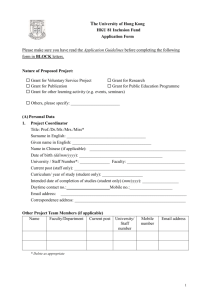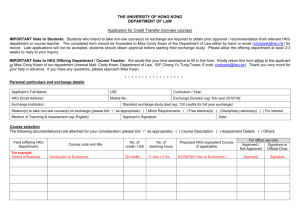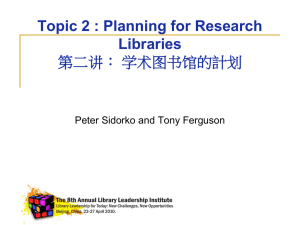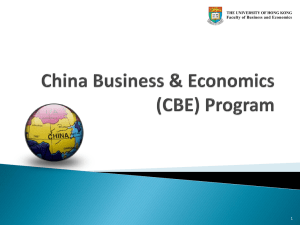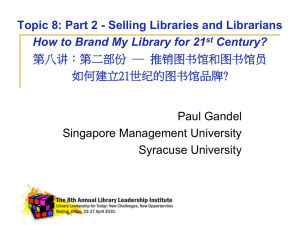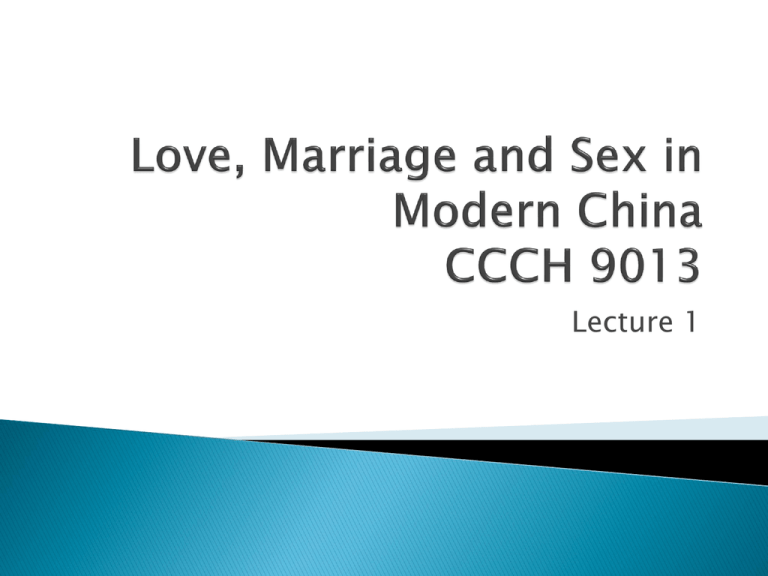
Lecture 1
Dr. P.S.Y HO, Department of Social Work and
Social Administration, psyho@hkucc.hku.hk
Dr. M.S.Y. LEE, Department of Sociology,
leesym@hkucc.hku.hk
Dr. B. BAKKEN, Department of Sociology,
bakken@hkucc.hku.hk
What does PRC stand for?
What does ROC stand for? (1912)
What is the CCP?
When did the CCP take over Mainland China
from the KMT?
Who was the Chairman of the Central
Government when the People’s Republic of
China was established in 1949?
中华人民共和国于1949年建立时,谁是中央人民
政府的主席?
When did the Cultural Revolution take place?
How did it end?
When did Mao Zedong die?
Who took over leadership after Mao’s death?
Who was the Second Generation leader of
post-1949 China?
1949年新中国建立以来中国的第二代领导人代表
是谁?
Who was Deng Xiaoping and why was he so
important to China?
谁是邓小平?为什么他在中国的地位这么重要?
What was Deng Xiaoping’s main formal
position in CCP and PRC? (1981-1989)
邓小平在中国共产党 /中华人民共和国最主要的正
式职位是什么?
In what year did Deng Xiaoping die?
邓小平是哪一年去世的?
In what year did Deng Xiaoping propose the
“One Country, Two Systems”?
邓小平在哪一年提出“一国两制”的构想?
1.
2.
3.
4.
5.
6.
Which 3 of these 6 slogans were said by Deng?
以下6条口号中的哪3条是邓小平提出的?
“Political power grows out of the barrel of a gun” “枪杆子里出
政权”
“No matter if it is a white cat or a black cat; as long as it can
catch mice, it is a good cat”“不管白猫黑猫,能抓到老鼠的就是
好猫”
“Power struggle is fun!” “与人斗,其乐无穷!”
“Cross the river by feeling the stones”“摸着石头过河”
“Practice is the sole test of truth”“实践是检验真理的唯一标准”
“All reputedly powerful reactionaries are merely paper tigers”
“一切反动派都是纸老虎”
What is the current exchange rate from HK
dollar to Renminbi (RMB)?
港币对人民币的最新汇率是多少?
How would you go about converting your
savings into RMB?
你是否考虑把储蓄币种转换成人民币?港币能够转
换人民币的上限?
When did China begin ‘Reform and Opening
up’ and what happened?
中国是什么时候开始实施改革开放政策的?有什么
新改变?
Why is the May Fourth movement (1920)
called the first sex revolution?
第一次性革命:1920年(源自“五四”运动)?
The Second sex revolution: 1950 (Marriage
Law), what was new about it?
第二次性革命:1950年(新《婚姻法》颁布), 有什
么新改变?
What was the third sex revolution in 20th
Century China? When did it happen?
20世纪中国的三次性革命及发生源起?有什么新改
变?
1980 (New marriage law), what was new
about it?
On average, how many sexual partners do
Chinese people have in their lifetimes?
中国人一生当中平均有多少个性伴侣?
How much sex do Chinese people have in a
year on average?
中国人一年中性生活的频率?
What is the difference between the two?
以下两个词有何不同之处?
Nu xin – (literally: female sex).
女性-(字面意义:性别为女)
Fu nu – (literally: Married woman/wife).
妇女-(字面意义:已婚女子)
What is the difference between the two?
Zhái nán (otaku, geek boy) 宅男
Guang guan (bare branch) 光棍
宅男和光棍有何区别?
What 3Ss can describe “surplus women”?
剩女的3Ss?
3 Hs?
剩女的3高是什么意思?
Who said this? 拜金女?
寧願在寶馬車裡哭,也不在自行車上笑
I would rather cry inside a BMW than laugh on
a bike!
I would rather cry inside a BMW rather than
laugh on a bike!
This is a famous line from an episode of the
dating game show “If You Are The One” in
2010
An unemployed guy asked his potential date,
“Would you like to take a ride with me on my
bike?”
She answered, I would rather cry sitting inside
a BMW …
Video
How does an individual like Miss X make her
dating choices and sexual decisions?
1. Family
2. Childhood
3. Personal history
4. Specific circumstances
5. Education
6. Popular discourse
7. Cultural norms
8. State/Political system/Law
9. Market/Economy
10.Performance of self
1.
2.
3.
4.
5.
6.
7.
8.
9.
10.
11.
12.
13.
14.
15.
16.
17.
Money
Physical appearance
Sex appeal
Occupation/Professional identity
Personality
Temperament
Political identity
Age
Family background
Class
Ethnicity
Compatibility
Communication
Passion/romantic feelings
Health
Education
Religion
1.
2.
3.
4.
5.
6.
7.
8.
9.
10.
11.
12.
13.
14.
15.
16.
17.
Money
Physical appearance
Sex appeal
Occupation/Professional identity
Personality
Temperament
Political identity
Age
Family background
Class
Ethnicity
Compatibility
Communication
Passion/romantic feelings
Health
Education
Religion
What is the divorce rate in China?
Can gay people get married in China?
在中国,同性恋是否可以结婚?
When was the One Child Policy introduced in
China?
中国的计划生育是何时开始实施?
Who suggested it?
This course begins from issues that are
personally relevant to young people – mate
choice, love, marriage, sex and family – with a
view to helping them think about the historical
and cultural roots of values concerning love,
sexuality, marriage and family life in China.
In particular, this course will examine the
profound transformation in Chinese values,
lifestyles, norms, and desires, from Maoist
utopianism to reform-era hedonism, which was
brought about by market reforms and the
opening of China.
This course enables students to understand how
love, sex and marriage constitute a useful lens
for understanding Chinese culture, thoughts,
values, and ways of life so as to provide a
glimpse into the complex interconnections
between political, cultural, economic and
interpersonal realms of experience.
Students will acquire basic tools of sociological
analysis through an introduction to theories such
as sociological approaches to love, marriage and
the family, second-wave feminist theories,
critical and queer theories, and cultural theories
of identity politics and globalization.
Miss LAI Man Yin Carine
黎文燕
carinelai@socwork.hku.hk
Miss LUI Wai Shan, Lydia
呂惠珊
lydialui@socwork.hku.hk
Miss SHAM, Priscilla
沈蔚
prissham@hku.hk
Miss HUANG Pengli
黃鵬麗
penglih@hku.hk
Miss FU Fang 付芳
fufang09@hku.hk
Miss LI Jie 李洁
lijie08@hku.hk
Miss ZHENG Jing, Sylvia
鄭靜
zhengj@hku.hk
Miss YANG Shuyan
楊姝焱
yangsy@hku.hk
Wang Tingyan, Tiffany
王婷豔
h1093016@hku.hk
Chinese women born in the 70s
Chinese women born in the 80s
Chinese women born in the 90s
Conducting an Interview (Proposal) 20%
Students will form groups of 3-5 people and submit a proposal to
conduct interview(s) for the group project.
The proposal should define research objectives and identify relevant
questions to ask chosen subject(s) whose personal relationships have
been affected in any way by the opening of the border between Hong
Kong and Mainland China.
Creating audio-visual materials (30%)
Question: What is the impact of the opening up of the border on the
lives of men and women in Hong Kong?
Students will produce a short film (up to 10 minutes long) based on their
interview(s) which will be presented to a public audience.
Case analysis report (10%)
Defining Concepts (20%)
Defining concepts and asking relevant
questions based on the readings.
Students are asked to discuss the strengths
or weaknesses of a given concept, and its
relevance to understanding modern China.
Attending digital storytelling workshops (10%)
Project presentations and public screening
(10%)
Digital storytelling workshop: 12 February, 2011 (Saturday),
9:00 a.m.-12:00 noon or 2:00-5:00 p.m.
Submission deadline for group project (interview proposal):
18 February 2011
Staff-student consultative committee (SSCC) meetings/focus
groups: 22 February or 8 March, 2011
Submission deadline for group project (film): 1 April 2011
Public screening of group projects:
11 April 2011, 7:00 p.m. – 10:30 p.m. at the HKKICC Lee
Shau Kee School of Creativity, 135 Junction Road, Kowloon
Submission deadline for group project (Case Analysis Report):
26 April, 2011
http://tgs.sw.hku.hk/
Tutorial Groups
Scheduled Days
Scheduled Time
Allocated
Location
Name
A
B
C
D
E
F
G
H
Monday
Tuesday
Tuesday
Tuesday
Thursday
Thursday
Friday
Friday
12:30 PM
11:30 AM
12:30 PM
4:00 PM
3:00 PM
6:00 PM
12:30 PM
3:00 PM
TT911
TT910
TT912
TT912
TT911
TT911
TT911
TT911

